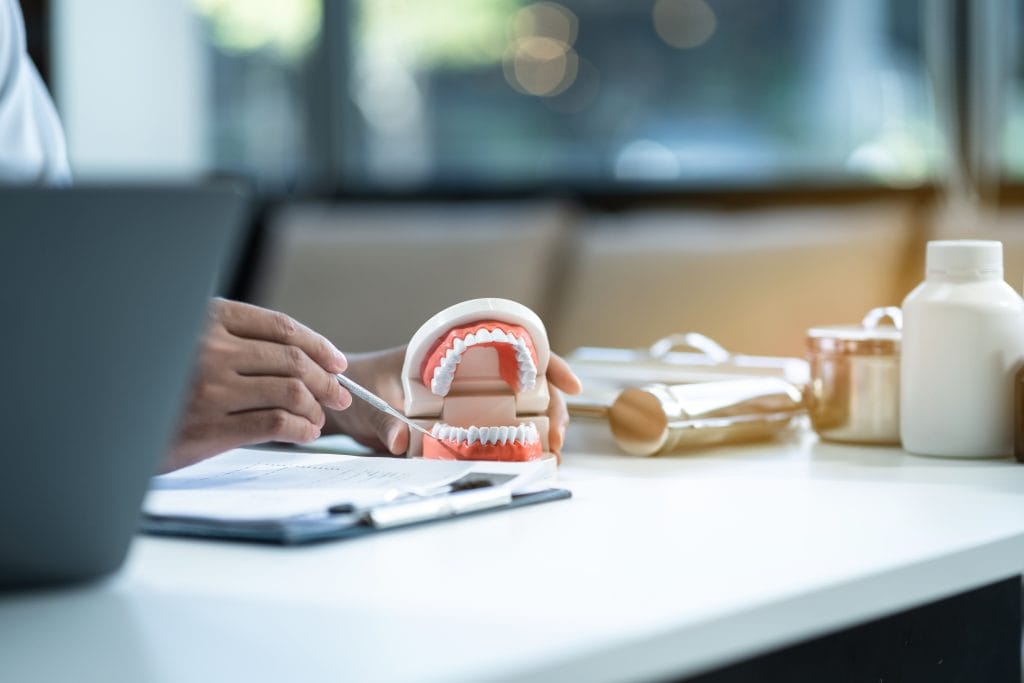Last updated on November 3rd, 2017 at 01:02 pm
 Managing staff while spending most of your time chairside is no easy task. And when things get out of hand, you may begin to feel more like a babysitter than a business owner.
Managing staff while spending most of your time chairside is no easy task. And when things get out of hand, you may begin to feel more like a babysitter than a business owner.
That said, managing your staff properly is vitally important, as the combined effort of the entire team is what generates all of the practice’s production and income. Staff conflict, unfortunately, can really throw a wrench in things.
So, assuming you’ve run into this – what should you do?
First off, all conflicts between your staff should be addressed immediately.
I would usually suggest the doctor (owner) addresses them unless you have an office manager who’s trained to handle things like this. In any event, don’t let it fester. And it will fester and become a bigger problem if you don’t handle it quickly and correctly.
While there are any number of reasons behind staff conflict, the most common I’ve found is multiple people doing the same job or trying to do each other’s jobs (this can include providing unsolicited advice to another on how to do their job). This is easily resolved by clearly delineating job functions and having up-to-date procedure manuals/policies that are not open for interpretation. This provides specific direction for on how things are done meaning there’s no reason for argument or confusion.
(Related: Seven Steps to a Well Trained Staff)
If there’s a personality conflict, it’s a different situation. Not all the people you meet are going to be the type of personality that you’d be best friends with. People are different. But ideally people can maintain enough of an air of professionalism so they can work these things out between each other. When sorting out a personality conflict, I usually refer the staff in question to the concept of professionalism. It’s a job, not a high school or family reunion. You’re expected to treat fellow employees courteously and with respect, regardless of their “personalities.” This normally resolves this issue, but there are a few circumstances where it can still be a problem:
The people having conflicts are talking to the other staff about it.
So you now get different cliques in the office at odds with each other. Jane (the receptionist) for whatever reason dislikes Joe the dental
 assistant (he parked in her parking space) and brings this up to Sue the hygienist – and so on. This particular behavior should be addressed in whatever employee manuals or company policy you might have. Not everybody is perfect and occasionally conflicts will arise, but if an employee has a problem with a staff member they might take it up with the individual staff member to resolve it or they may go to the doctor (or office manager depending on the size and organization of your office). How to address various issues like this should be established in your office policy. The purpose here is to keep the office environment pleasant and professional. It also prevents disagreements from creating an uncomfortable work environment.
assistant (he parked in her parking space) and brings this up to Sue the hygienist – and so on. This particular behavior should be addressed in whatever employee manuals or company policy you might have. Not everybody is perfect and occasionally conflicts will arise, but if an employee has a problem with a staff member they might take it up with the individual staff member to resolve it or they may go to the doctor (or office manager depending on the size and organization of your office). How to address various issues like this should be established in your office policy. The purpose here is to keep the office environment pleasant and professional. It also prevents disagreements from creating an uncomfortable work environment.You find one staff member whose attitude is so “toxic” that they always seem to have “problems” with the rest of the staff.
 This is a rare occurrence, but it can happen. Chances are, you’ve worked in an environment like this at some point in your career. You have to look at this as an executive and leader of your group. Regardless of their personal productivity or how well they know the office or patients, they might be hindering overall group productivity. If this is truly the case, it may be more productive in the long run to replace this staff member with someone who is productive and also has a good attitude.
This is a rare occurrence, but it can happen. Chances are, you’ve worked in an environment like this at some point in your career. You have to look at this as an executive and leader of your group. Regardless of their personal productivity or how well they know the office or patients, they might be hindering overall group productivity. If this is truly the case, it may be more productive in the long run to replace this staff member with someone who is productive and also has a good attitude.
Ultimately the staff has to understand that nobody is perfect and that we work together in a group of people because we feel that a group can get more done than individuals. Therefore as a member of the team they have a responsibility to make sure that their teammates are doing well and remaining a part of the group from both a productivity and camaraderie standpoint. If you create this atmosphere with your team, you should be able to avoid major problems.
Hope this helps!
 assistant (he parked in her parking space) and brings this up to Sue the hygienist – and so on. This particular behavior should be addressed in whatever employee manuals or company policy you might have. Not everybody is perfect and occasionally conflicts will arise, but if an employee has a problem with a staff member they might take it up with the individual staff member to resolve it or they may go to the doctor (or office manager depending on the size and organization of your office). How to address various issues like this should be established in your office policy. The purpose here is to keep the office environment pleasant and professional. It also prevents disagreements from creating an uncomfortable work environment.
assistant (he parked in her parking space) and brings this up to Sue the hygienist – and so on. This particular behavior should be addressed in whatever employee manuals or company policy you might have. Not everybody is perfect and occasionally conflicts will arise, but if an employee has a problem with a staff member they might take it up with the individual staff member to resolve it or they may go to the doctor (or office manager depending on the size and organization of your office). How to address various issues like this should be established in your office policy. The purpose here is to keep the office environment pleasant and professional. It also prevents disagreements from creating an uncomfortable work environment. This is a rare occurrence, but it can happen. Chances are, you’ve worked in an environment like this at some point in your career. You have to look at this as an executive and leader of your group. Regardless of their personal productivity or how well they know the office or patients, they might be hindering overall group productivity. If this is truly the case, it may be more productive in the long run to replace this staff member with someone who is productive and also has a good attitude.
This is a rare occurrence, but it can happen. Chances are, you’ve worked in an environment like this at some point in your career. You have to look at this as an executive and leader of your group. Regardless of their personal productivity or how well they know the office or patients, they might be hindering overall group productivity. If this is truly the case, it may be more productive in the long run to replace this staff member with someone who is productive and also has a good attitude.

No Comments
Be the first to start a conversation